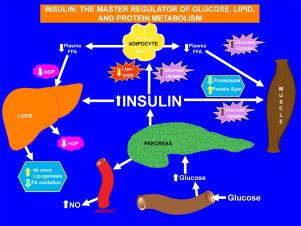Metabolism ( IF 10.8 ) Pub Date : 2022-01-20 , DOI: 10.1016/j.metabol.2022.155142 Luke Norton 1 , Chris Shannon 1 , Amalia Gastaldelli 2 , Ralph A DeFronzo 1

|
Insulin is the master regulator of glucose, lipid, and protein metabolism. Following ingestion of an oral glucose load or mixed meal, the plasma glucose concentration rises, insulin secretion by the beta cells is stimulated and the hyperinsulinemia, working in concert with hyperglycemia, causes: (i) suppression of endogenous (primarily reflects hepatic) glucose production, (ii) stimulation of glucose uptake by muscle, liver, and adipocytes, (iii) inhibition of lipolysis leading to a decline in plasma FFA concentration which contributes to the suppression of hepatic glucose production and augmentation of muscle glucose uptake, and (iv) vasodilation in muscle, which contributes to enhanced muscle glucose disposal. Herein, the integrated physiologic impact of insulin to maintain normal glucose homeostasis is reviewed and the molecular basis of insulin's diverse actions in muscle, liver, adipocytes, and vasculature are discussed.
中文翻译:

胰岛素:糖代谢的主要调节剂
胰岛素是葡萄糖、脂质和蛋白质代谢的主要调节剂。摄入口服葡萄糖负荷或混合膳食后,血浆葡萄糖浓度升高,β 细胞分泌胰岛素受到刺激,高胰岛素血症与高血糖症共同作用,导致:(i) 抑制内源性(主要反映肝脏)葡萄糖生成(ii) 刺激肌肉、肝脏和脂肪细胞摄取葡萄糖,(iii) 抑制脂肪分解导致血浆 FFA 浓度下降,这有助于抑制肝葡萄糖产生和增加肌肉葡萄糖摄取,以及 (iv)肌肉中的血管舒张,这有助于增强肌肉葡萄糖的处理。在此处,































 京公网安备 11010802027423号
京公网安备 11010802027423号